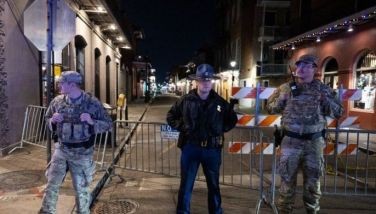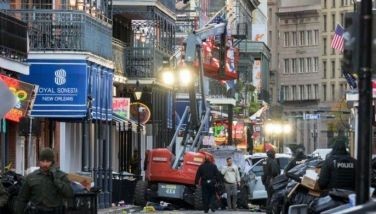Iran's new president calls Israel an 'old wound'
TEHRAN, Iran (AP) — Ahead of his inauguration, Iran's new president on Friday called Israel an "old wound" that should be removed, while tens of thousands of Iranians marched in support of Muslim claims to the holy city of Jerusalem.
Hasan Rouhani's remarks about Israel — which Iran considers to be its archenemy — echoed longstanding views of other Iranian leaders and could tarnish his image in the West as a voice of moderation in Iranian affairs.
But no Iranian leader is likely to diverge from Iran's longstanding denunciations of Israel and the remarks are not necessary evidence that Rouhani would roll back his support for calmer relations with the West, including possible one-on-one dialogue with Washington.
"The Zionist regime has been a wound on the body of the Islamic world for years and the wound should be removed," Rouhani was quoted as saying by the semi-official ISNA news agency.
The president-elect also expressed doubts about the possibility of an Israeli-Palestinian peace deal even as the two sides resumed negotiations in Washington this week, ending a five-year freeze in Mideast talks.
However, Rouhani's official website later Friday published somewhat different comments, citing him only as saying that "the occupation of Palestine and Jerusalem ... is a wound on the body of the Islamic world," without any direct reference to Israel or saying that this wound should be removed.
The two versions of his comments could not immediately be reconciled.
Israel's Prime Minister Benjamin Netanyahu promptly condemned Rouhani's remarks. The Israeli leader has urged the world to step up pressure on Tehran to halt its disputed nuclear program with tougher sanctions and threats of military action.
Rouhani won a landslide victory in Iran's June 14 presidential election and is to officially replace Mahmoud Ahmadinejad on Sunday.
Netanyahu said Rouhani's statement on Friday should serve to "wake up the world from the illusion" that a new Iranian president meant a new policy by Tehran.
"The real face of Rouhani has been exposed earlier than expected," Netanyahu said. "This is what the man thinks and this is the Iranian regime's operational plan ... A country that threatens to destroy Israel must not be allowed weapons of mass destruction."
Rouhani spoke at an annual pro-Palestinian rally marking "Al-Quds Day" — the Arabic word for Jerusalem — and although his remarks appear contrary to his outreach efforts to the West, they should also be seen in the context of internal Iranian politics where softening the establishment's anti-Israeli stand is not an option.
Iran does not recognize Israel and has since the 1979 Islamic Revolution observed the last Friday of the Islamic month of Ramadan as "Al-Quds Day." Tehran says the occasion is meant to express support for Palestinians and emphasize the importance of Jerusalem for Muslims.
Anti-Israeli rallies were held in cities and towns across Iran. In the capital, Tehran, tens of thousands took to the streets, chanting "Down with America" and "Death to Israel." Some protesters also burned American and Israeli flags.
Outgoing President Ahmadinejad - who was known for vitriolic anti-Israeli rhetoric while in office, including calls that Israel be destroyed - spoke to the crowds after Friday prayers at the Tehran University campus in his last public speech before his term ends.
"You Zionists planted a wind but you will harvest a storm," said Ahmadinejad. "A destructive storm is on the way and it will destroy Zionism."
Israel has not ruled out a military option against Iran's nuclear facilities, which the West suspects are geared toward making a nuclear weapon. Tehran denies the charge and insists its nuclear program is meant for peaceful purposes only.
- Latest
- Trending
































